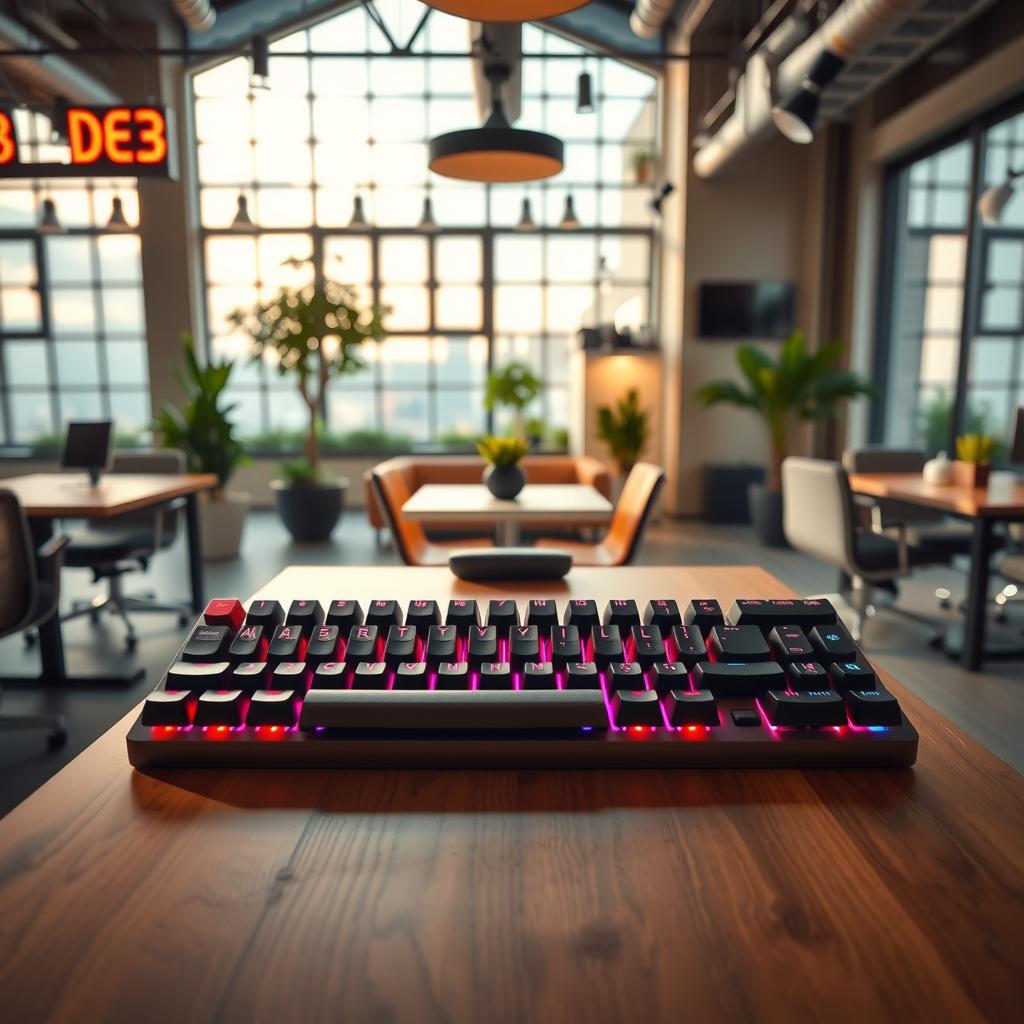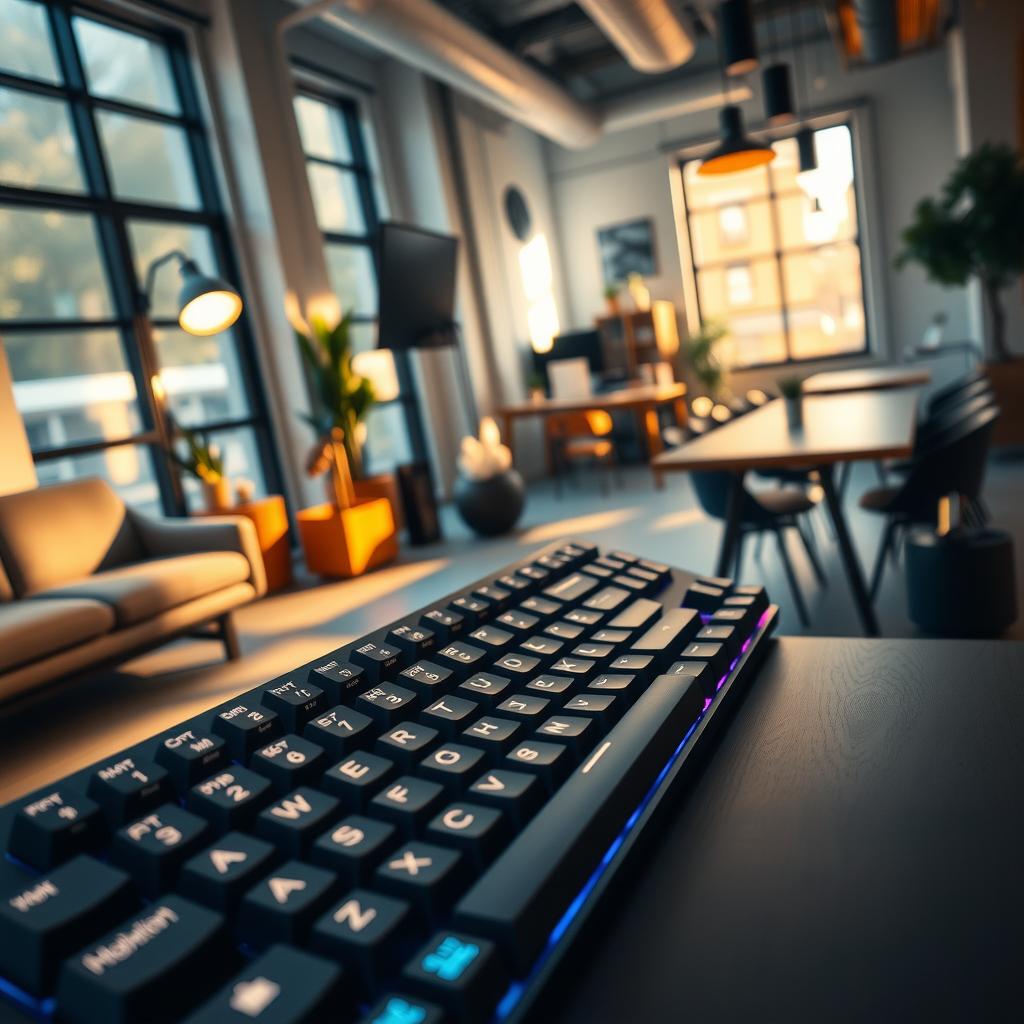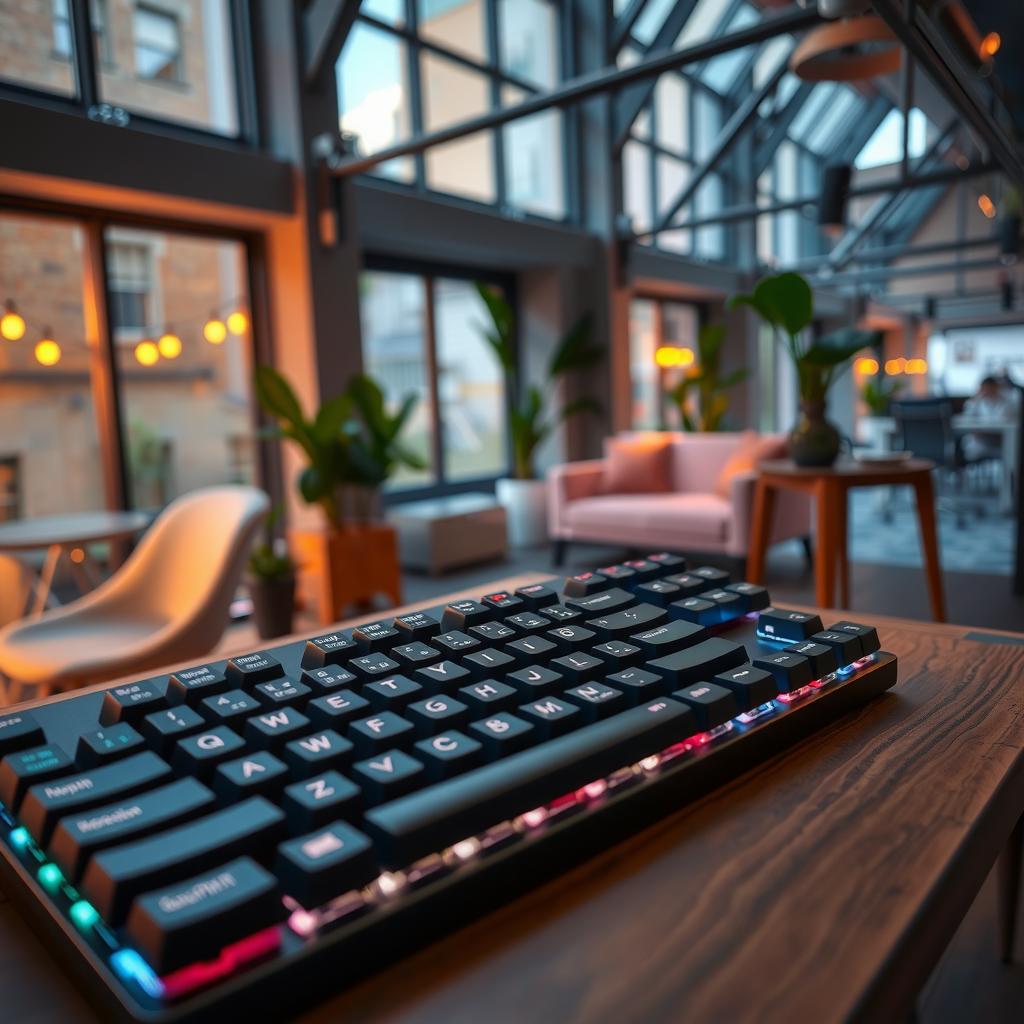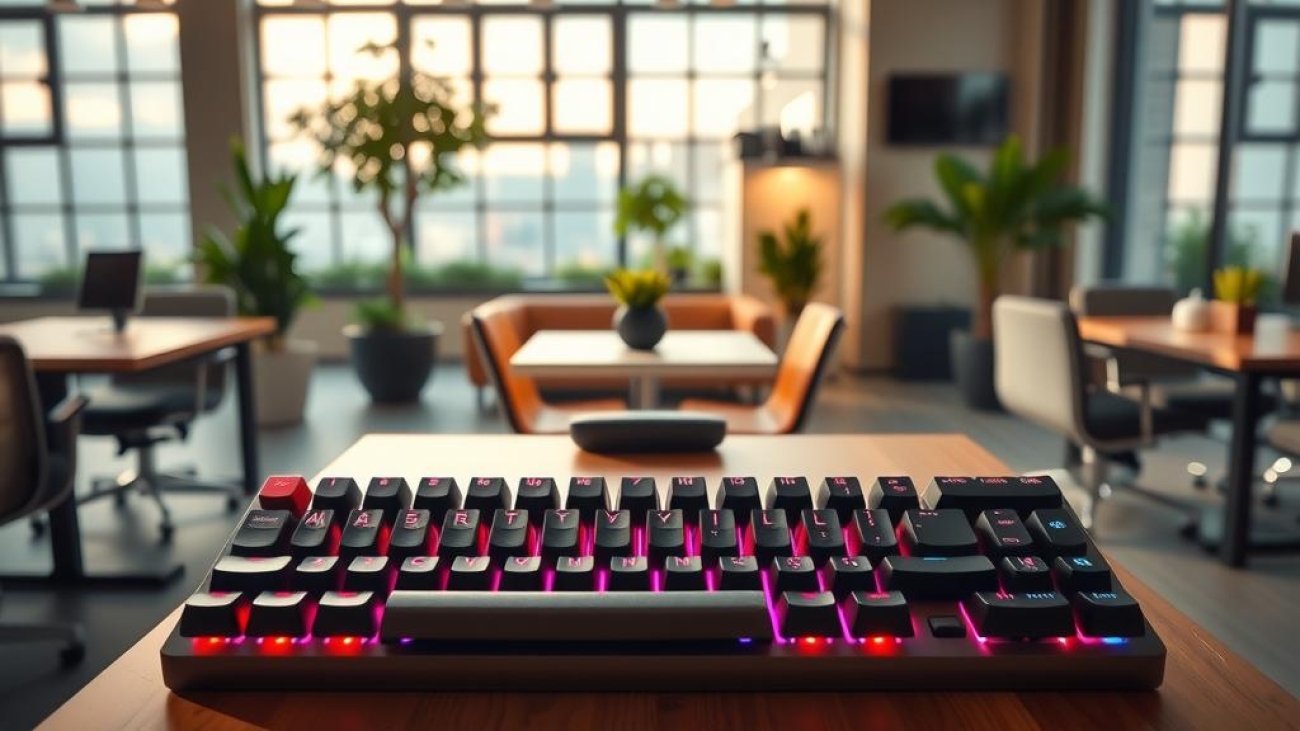In today’s open-plan offices and coworking spaces, the clattering of keyboards can often drown out focused conversations and creative brainstorming sessions. Have you ever wondered how such a simple tool could impact productivity in shared environments? With an increasing number of professionals seeking a balance between collaboration and concentration, the demand for mechanical keyboards that prioritize quiet typing has surged. This article delves into the world of mechanical keyboards, examining their noise reduction capabilities, ergonomic designs, and overall contribution to creating harmonious coworking spaces.
The core value lies in understanding that not all keyboard types are created equal; while traditional membrane keyboards may offer silence at the cost of tactile feedback, many users find themselves longing for both comfort and efficiency. The right choice—as it turns out—can significantly enhance typing comfort during long hours spent at a desk. For those navigating bustling office environments or shared workspaces where noise levels can be disruptive, investing in quality mechanical keyboards designed for quiet operation becomes essential.
These specialized mechanical keyboards employ advanced switch technology aimed at minimizing sound without sacrificing performance or feel. Users will discover that models featuring silent switches provide an ideal solution to maintaining focus while respecting colleagues’ needs for peace and productivity. As we explore various options available on the market today, it’s important to understand how features like noise reduction contribute not only to individual enjoyment but also foster a collaborative atmosphere conducive to creativity.
Moreover, integrating ergonomic design elements in these mechanical keyboards enhances user experience by promoting better posture during extended use—a key factor often overlooked when selecting office equipment. Beyond personal comfort lies another critical aspect: improved productivity tools lead directly to increased output without overwhelming auditory distractions.
As this exploration unfolds further into specific models and their unique attributes tailored for coworkers who enjoy working quietly together yet effectively—readers will gain insights into making informed choices about their next keyboard purchase. By focusing on how these innovative solutions cater precisely to modern workspace demands, professionals can cultivate an environment where ideas flourish amidst serenity rather than chaos.

Key Insights:
-
The Importance of Quiet Typing in Coworking Spaces: Balancing Productivity and Peace
In modern coworking spaces, the challenge lies in maintaining a productive environment while minimizing distractions. The incessant noise from traditional keyboards can hinder concentration, making it essential to explore mechanical keyboards designed for quiet typing. These devices provide an optimal blend of sound reduction and performance, fostering a harmonious atmosphere that enhances productivity. -
Ergonomic Design Promotes Comfort During Long Hours: A Must-Have Feature
When selecting office equipment for prolonged use in shared environments, typing comfort becomes paramount. Many mechanical keyboards feature ergonomic designs that support extended hours of typing without causing fatigue. By prioritizing both comfort and functionality, these productivity tools allow professionals to focus on their tasks while respecting the tranquility required by their coworkers. -
Diverse Options Tailored for Modern Workspaces: Personalization Meets Functionality
The market offers numerous models of mechanical keyboards specifically crafted for coworking spaces, featuring low-profile keys that significantly lower noise levels. Additionally, customizable lighting options add a personal touch without creating distractions. Such thoughtful innovations illustrate how these advanced pieces of office equipment cater to diverse preferences while ensuring minimal disruption during work hours.

The Evolving Nature of Workspaces
Understanding the Need for Acoustic Comfort in Coworking Spaces
In today’s fast-paced work environment, the significance of a quiet workspace cannot be overstated. As coworking spaces become increasingly popular, they also bring challenges related to noise levels that can detract from productivity. Effective sound-reducing solutions are essential in these communal settings where individuals from diverse backgrounds and professions converge. Noise pollution not only disrupts concentration but can also lead to increased stress and decreased job satisfaction among workers. Thus, creating an acoustic-friendly environment is paramount for enhancing overall employee well-being and efficiency. One effective way to achieve this is by incorporating mechanical keyboards into the office equipment roster. These keyboards often provide a satisfying tactile response with significantly lower sound output compared to traditional models, promoting quiet typing practices that respect shared spaces.
Enhancing Productivity through Sound Reduction
The Role of Ergonomic Design in Modern Office Equipment
The design of office equipment plays a crucial role in not only reducing noise but also improving employee comfort and productivity. With many professionals now opting for flexible arrangements, coworking spaces must adapt by providing ergonomic tools tailored to various working styles. Among these tools, mechanical keyboards stand out due to their ability to offer both performance and comfort during extended use sessions. Their varied switch options allow users to select between different levels of auditory feedback—some switches produce minimal sound while maintaining excellent tactile responses suited for quick typists or those who prefer quieter environments. By integrating such ergonomic designs into workspaces, organizations can create an atmosphere conducive to focus while simultaneously minimizing distractions caused by loud typing noises.
Cultivating Focused Work Environments
Strategies for Implementing Noise-Reducing Solutions
Implementing effective noise-reduction strategies within coworking spaces requires thoughtful consideration of workspace layout as well as the selection of appropriate technology like mechanical keyboards designed specifically with quiet operation in mind. For instance, introducing designated quiet zones equipped with low-noise office equipment fosters an environment where individuals seeking solitude can thrive without interruptions from others’ activities nearby. Moreover, utilizing materials known for their sound-absorbing properties—such as acoustic panels or carpets—can help reduce ambient noise levels throughout large open areas common in coworking setups. When combined with high-quality input devices like mechanical keyboards optimized for silent operation during typing tasks, such strategies promote enhanced concentration among coworkers engaged in focused projects.
The Future Outlook on Workspace Design
Embracing Innovation While Prioritizing Comfort
As more businesses embrace remote work alongside traditional models within coworking frameworks, there will be an increasing emphasis on innovative workplace designs prioritizing comfort alongside functionality—the dual objectives driving modern office trends forward today include fostering collaboration while ensuring individual needs are met effectively through strategic planning around acoustics management systems integrated seamlessly into existing structures or new developments alike! Mechanical keyboards serve as exemplary examples here; not only do they enhance user experience via exceptional ergonomics but they also embody cutting-edge technology catering directly towards reducing intrusive sounds typically associated with standard keyboard usage found across various industries requiring concentrated efforts daily over long periods spent at desks! Henceforth investing wisely into reliable products delivering outstanding performance—like mechanical keyboards crafted meticulously using advanced techniques beneficially impacts overall outcomes wherever applied ultimately leading toward higher morale amongst teams producing exceptional results consistently time after time regardless if collaborating remotely together apart physically present side-by-side sharing ideas spontaneously brainstorming creatively solving problems innovatively addressing challenges faced head-on collaboratively moving ahead confidently toward achieving collective goals successfully!

Key Features of Mechanical Keyboards: The Intersection of Noise Reduction and Comfort
Enhancing Productivity in Shared Spaces
In today’s increasingly collaborative work environments, such as coworking spaces, the demand for mechanical keyboards that offer both comfort and noise reduction has surged. Many professionals seek tools that enhance their productivity without disrupting those around them. This is where ergonomic design plays a vital role; it not only supports proper hand positioning but also minimizes strain during extended typing sessions. Advanced switch technology further contributes to this balance by providing various tactile experiences—ranging from soft and quiet to clicky yet satisfying—catering to individual preferences while mitigating excessive sound output.
The Importance of Specialized Switches
Specialized switches in mechanical keyboards are engineered with user comfort in mind, offering a diverse array of options tailored for different typing styles. For instance, silent mechanical switches are specifically designed to reduce noise levels significantly compared to traditional counterparts while still maintaining the responsiveness required for efficient typists. These innovations make them ideal for office equipment used in shared settings where distraction must be minimized. Users can enjoy the benefits of precise actuation without compromising on auditory peace—a crucial factor when one’s workspace is adjacent to colleagues engaged in similar tasks.
Ergonomic Designs: A New Standard
The ergonomic designs found in modern mechanical keyboards elevate typing comfort while catering particularly well to long-duration use. Contoured shapes and adjustable features allow users to maintain a neutral wrist position, reducing fatigue over time and enhancing overall productivity levels. Coupled with quieter key mechanisms, these keyboards promote an unobtrusive working atmosphere conducive to concentration—an essential quality when collaborating closely within open-plan offices or remote setups alike. By investing in ergonomically optimized models, businesses can create healthier workspaces where employees thrive without sacrificing personal space.
Striking the Right Balance Between Sound and Feel
Ultimately, selecting the right mechanical keyboard involves understanding individual needs regarding sound preference versus tactile feedback requirements. While some users may favor a more audible typing experience reminiscent of classic typewriters—often characterized by clicky sounds—the growing trend promotes quieter alternatives that do not compromise on feel or performance capabilities under pressure situations like meetings or brainstorming sessions. Thus, exploring various models allows individuals not just to find their perfect fit but also ensures they contribute positively towards fostering harmonious coworking environments through effective noise management strategies paired with superior design principles.
Top Recommendations for Quiet Mechanical Keyboards
Elevating the Office Experience with Silent Solutions
In collaborative spaces, where productivity thrives on a harmonious atmosphere, the choice of office equipment can significantly impact the work environment. For individuals seeking to enhance their typing experience without disturbing colleagues, mechanical keyboards designed for quiet typing are an essential tool. These keyboards combine innovative noise reduction technology with ergonomic design to ensure that users can type comfortably while minimizing sound disruption. Models like the Keychron K1 and Logitech G915 TKL exemplify this blend of functionality and style; they utilize low-profile switches that provide satisfying tactile feedback without the loud clatter typically associated with traditional mechanical keyboards. The inclusion of features such as customizable RGB lighting also allows users to personalize their workspace aesthetic while maintaining focus on their tasks.
Crafting a Productive Workspace
The Importance of Typing Comfort in Shared Environments
When selecting mechanical keyboards for coworking spaces or shared offices, typing comfort becomes paramount. Ergonomically designed models not only reduce strain during extended typing sessions but also promote overall wellness among users. Keyboards such as the Das Keyboard Model S Professional offer cushioned palm rests and adjustable heights, ensuring optimal posture and reducing fatigue over time. Moreover, many modern mechanical keyboards incorporate soft landing pads under each key to absorb sound effectively when keys are pressed down or released—further enhancing quiet operation. This attention to both comfort and noise reduction makes these devices invaluable productivity tools in environments where concentration is key.
Versatility Meets Silence
Diverse User Preferences Accommodated
Understanding that different users have unique preferences is crucial when recommending mechanical keyboards tailored for quiet environments. Some may favor tactile switches like Cherry MX Brown or Gateron Brown due to their subtle feedback without excessive noise; others might prefer linear switches such as Cherry MX Red or Gateron Red for smoother keystrokes ideal for rapid typing tasks. Brands like Razer, through models like Razer Huntsman Mini, cater specifically to gamers who require silence alongside performance—showcasing how versatility extends beyond mere office use into various fields requiring high-speed input without compromising acoustics. With options available across diverse styles and functionalities, finding the right fit enhances user satisfaction while fostering effective collaboration in any shared space.
Innovative Features Enhance Usability
Embracing Technology While Maintaining Silence
Today’s leading mechanical keyboards come packed with advanced features aimed at improving usability while prioritizing silent operation—a vital aspect within bustling work settings. Many models now offer programmable keys allowing users easy access to shortcuts that streamline workflow processes—an important feature considering how integral efficiency is within collaborative spaces filled with multiple projects occurring simultaneously! Additionally, some manufacturers equip their products with software support enabling seamless customization tailored specifically toward individual needs: from adjusting backlighting patterns based on mood lighting preferences—to creating macro commands enhancing task execution speed—all achievable whilst keeping disruptive sounds at bay! As organizations increasingly adopt flexible working arrangements emphasizing collaboration among teams—even amidst open-plan layouts—the demand continues growing steadily towards quality yet quieter keyboard solutions capable of meeting these evolving workplace dynamics seamlessly.
Frequently Asked Questions:
Q: What are the benefits of using mechanical keyboards in coworking spaces?
A: Mechanical keyboards provide a tactile typing experience that enhances comfort and efficiency. Their ergonomic design helps reduce fatigue during long hours of work, making them ideal productivity tools for professionals in coworking spaces. Additionally, many models incorporate features focused on noise reduction, allowing users to maintain concentration without disrupting their surroundings.
Q: How do I choose a quiet mechanical keyboard for my office?
A: When selecting a quiet mechanical keyboard, consider options with specialized switches designed for quiet typing. These switches minimize sound while still offering satisfying feedback. Look for models that emphasize noise reduction, as well as those with low-profile keys or customizable features that can enhance the overall user experience without causing distractions in shared environments.
Q: Are there mechanical keyboards specifically designed for long-term use?
A: Yes, many modern mechanical keyboards prioritize user comfort through thoughtful engineering. Features such as adjustable height, wrist rests, and high-quality materials contribute to an enhanced typing experience suitable for extended periods. This focus on typing comfort ensures that users can enjoy their time at the keyboard while maximizing their productivity levels in any workspace setting.
